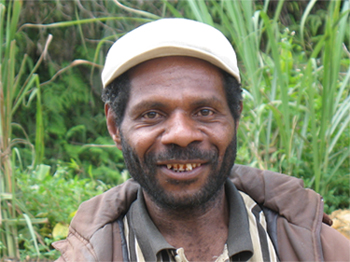
Daniel Wemp smiles at photographer and imediaethics researcher Michael Kigl, in the Southern Highlands of Papua New Guinea, July 2008. Kigl quickly located Wemp, even though New Yorker fact checkers failed to do so. Wemp adamantly denies Diamond's quotations that convey most of the facts in the New Yorker tale were ever said by him. Dr. Douglas Biber's conclusion that the words Diamond quoted were in all likelihood academic writing and not speech, supports Wemp's claim with science.
>The Pig in a Garden: Jared Diamond and The New Yorker Series
Art Science Research Laboratory’s imediaethics.org is publishing a series of essays on the controversy surrounding Jared Diamond’s New Yorker article, “Annals of Anthropology: Vengeance is Ours.” The essay series titled,The Pig in a Garden: Jared Diamond and The New Yorker, is written by ethics scholars in the fields of anthropology and communications, as well as journalists, environmental scientists, archaeologists, anthropologists and linguists et al., and edited by Rhonda Roland Shearer, Alan Bisbort and Sam Eifling. *Note: Savage Mind people are leaving for the summer for research and find themselves unable to keep up with posting essays of , what has turned out to be, more contributors than anticipated. imediaethics.org will continue the series with the same editors. Alex Golub will comment from Papua New Guinea as time allows. Douglas Edward Biber’s essay is seventh in the series. Biber’s full analysis and report for iMediaEthics is also released here.
* * * * * * *
imediaethics Release:
Dr. Biber’s report and full analysis of quotations Jared Diamond attributes to Daniel Wemp in his New Yorker article, “Annals Of Anthropology,” April 21, 2009 . (Biber’s CV).
Introduction to Dr. Biber’s “The Pig in a Garden” essay:
The language of conversation is dramatically different from the language of academic writing. Some of the differences between the two are obvious to all of us, such as contractions and incomplete sentences. However, many other grammatical differences are much more difficult to detect.
Over the last 25 years, a research approach has been developed for the empirical analysis of such grammatical characteristics. Referred to as ‘corpus linguistics’, the approach is based on the analysis of very large collections of natural texts from thousands of individual speakers and writers. Computer programs aid the analyses, which result in descriptions of grammatical features that occur frequently, features that are typical, and features that rarely occur. In addition, by comparing corpora with different kinds of texts, it is possible to contrast the grammatical characteristics that are usually found in conversation to those usually found in academic writing (or any other spoken or written varieties).
One major strength of corpus analysis is that it allows researchers to identify patterns of language use that might otherwise go unnoticed. Some language features are quite salient and even stereotyped. For example, we are probably all aware that conversation contains numerous contractions (e.g., I’m, can’t) and reduced forms (e.g., gonna). But it is more difficult to notice the core grammatical structures used in conversation, and how those are different from the typical grammatical structures of written texts.
A simple case study: Did Dowd appropriate language from a spoken conversation?
One application of corpus research is to analyze the language of quotes, to determine the likelihood that those quotes were actually produced in speech. For example, Maureen Dowd has recently been accused of plagiarizing a passage from a blog post by Josh Micah Marshall. What makes this case interesting is that Maureen Dowd denies reading Marshall’s blog, and wrote to Huffington Post that she heard the passage when it was produced by a friend in a conversation. The passage in question consists of a single, complex sentence:
“More and more the timeline is raising the question of why, if the torture was to prevent terrorist attacks, it seemed to happen mainly during the period when the Bush crowd was looking for what was essentially political information to justify the invasion of Iraq.”
Corpus-linguistic analysis can be applied to cases like this. The first step is to document the grammatical characteristics of the text passage in question. Then, those grammatical characteristics are analyzed in a large corpus of texts, to determine how common or rare they are. Crucially, the corpus needs to represent the relevant varieties of language. Thus, in the present case, we would consider whether these grammatical structures occur in a corpus of conversation.





